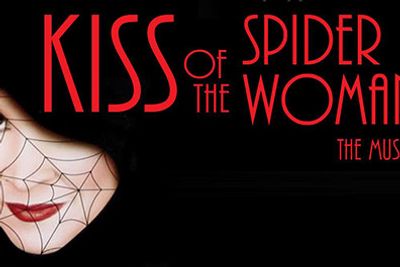By Richard Schultz, June 2016 Issue.
David Hock, executive producer of the Scottsdale Musical Theater Company, loves a challenge. He must because his company continues to mount classic Broadway musicals and stage them as if they were in New York, including a full orchestra, a rarity for the local theater scene.
For his latest endeavor, his company will present John Kander and Fred Ebb’s Kiss of the Spider Woman May 25-29 at Tempe Center for the Arts.
This musical revamps a harrowing tale of persecution into a dazzling spectacle that juxtaposes gritty realities with liberating fantasies. Serving an eight-year sentence in a Latin American prison for homosexuality, Luis Molina regularly escapes the torture and humiliation by inventing a fantasy world of movies starring vampy diva, Aurora. But his ability to escape reality is tested by his new cellmate, a Marxist revolutionary named Valentin.
Despite falling in love with Valentin, Luis has been co-opted by the prison warden and the secret police to get information out of his cellmate in exchange for early parole.
While embracing hope and the beauty of love, this musical poses the question: Can Luis’ fantastical tales of Aurora and her Spider Woman character help navigate the dangerous events of the real world?
According to director Hector Coris, a long-time a fan of the score, he was searching for a smaller show with a more intimate setting.
“It’s grander than Kander and Ebb’s other scores and more sophisticated,” he said. “It is also a show that hasn’t been seen in the Valley in over 10 years. Part of the decision was to give Valley a show that no one is familiar with, but has major Broadway pedigree.”
When asked why the show isn’t produced more, Coris said he’s “sure it’s the subject matter of the show … homosexuality, torture and the politics. However, the show is not exploitative or sensational. The story existed long before Manuel Puig’s Pulitzer Prize-winning novel. It’s a powerful love story set in the most despicable location.”
Coris also acknowledged that the most difficult part of directing the musical is its cinematic nature.
“Scenes are rather short and they jump between locations just like a movie,” he said. “Making these scenes all flow together seamlessly is a challenge. Another challenge is how to get the tone just right; to have the audience believe in this unlikely pairing and the blossoming of their love.”
The production is being staged in the smaller Studio Theater at Tempe Center for the Arts because it’s more intimate. Coris is certain that having the audience closer to the action will also intensify the experience.
Coris believes that this musical will speak to the LGBTQ community with its strong lead gay character.
“[Luis] is not relegated to the funny best friend role,” he said. “He’s front and center, and he’s loving, damaged, beautiful, bitchy, weak and strong. He’s a fully realized complex character with a relationship to his mother that is groundbreaking in its honesty – it was at the time and I think still holds up now, even with slightly more accepting parents. It’s a relationship that needs to be seen and emulated.”
According to local actor Michael Schauble, who plays Luis, he has been tremendously moved by the opportunity to play this multidimensional character.
“He is a kind, sensitive, passionate, brave, wonderful human being who has journeyed through life, seeing much more bad than good,” Schauble said. “Yet, [Luis] finds the moments to live for and uses those to give his life meaning. Playing [Luis] has shed light on what truly matters in my life. It means the world to me that I can share him with an audience.”
Additionally, music director Curtis Moeller said he finds the show’s early use of a gay male as the main character fascinating.
“Up to that point, only a few shows had successfully featured such prominent LGBT inclusion,” Moeller said. “Only La Cage aux Folles, the Falsettos trilogy, and The Rocky Horror Picture Show come to mind. In some ways, I see it as Kander and Ebb’s second chance. Their early musical Cabaret is based on Christopher Isherwood’s semi-autobiographical Goodbye to Berlin, which should have resulted in a leading gay Englishman rather than the straight American that audiences got in 1966. I think that by 1993, they felt ready to have a show feature a proudly gay man as the pivotal character.”
This musical represents the last big hit for the Kander and Ebb, Moeller added.
“They stayed with their successful formula of having ‘dream sequence’ songs comment on and foreshadow the primary plot points of the show similar to Chicago and Cabaret, but they still stretched themselves,” Moeller said. “Musically they branched out into Latin rhythms with lots of percussion, explored shifting time meters, and played with longer forms where we just go from song to song to song without a break.”
Kiss of the Spider Woman won the 1993 Tony Awards for Best Musical, Best Book and Best Score when it debuted on Broadway with Chita Rivera. The 1985 film starred William Hurt and Raul Julia.
Kiss of the Spider Woman
Scottsdale Musical Theater Company
Tempe Center for the Arts
700 Rio Salado Parkway, Tempe
Tickets: $28-$34; 602-909-4215
scottsdalemusicaltheater.com
